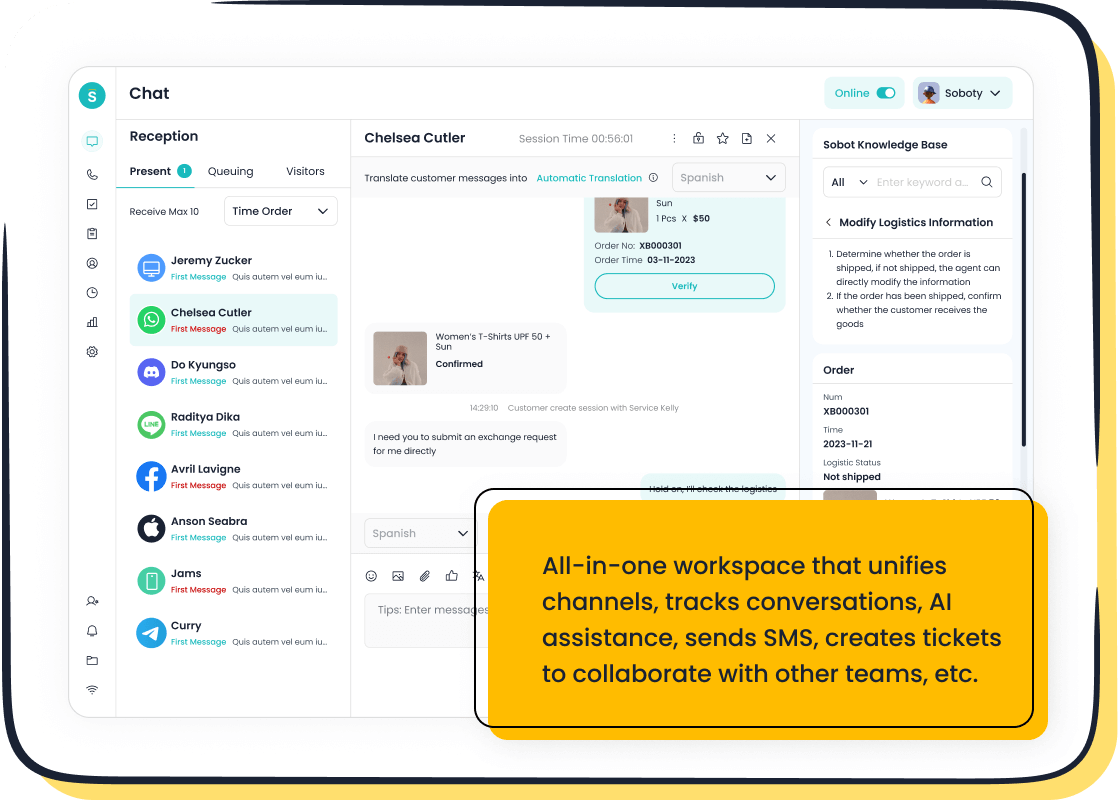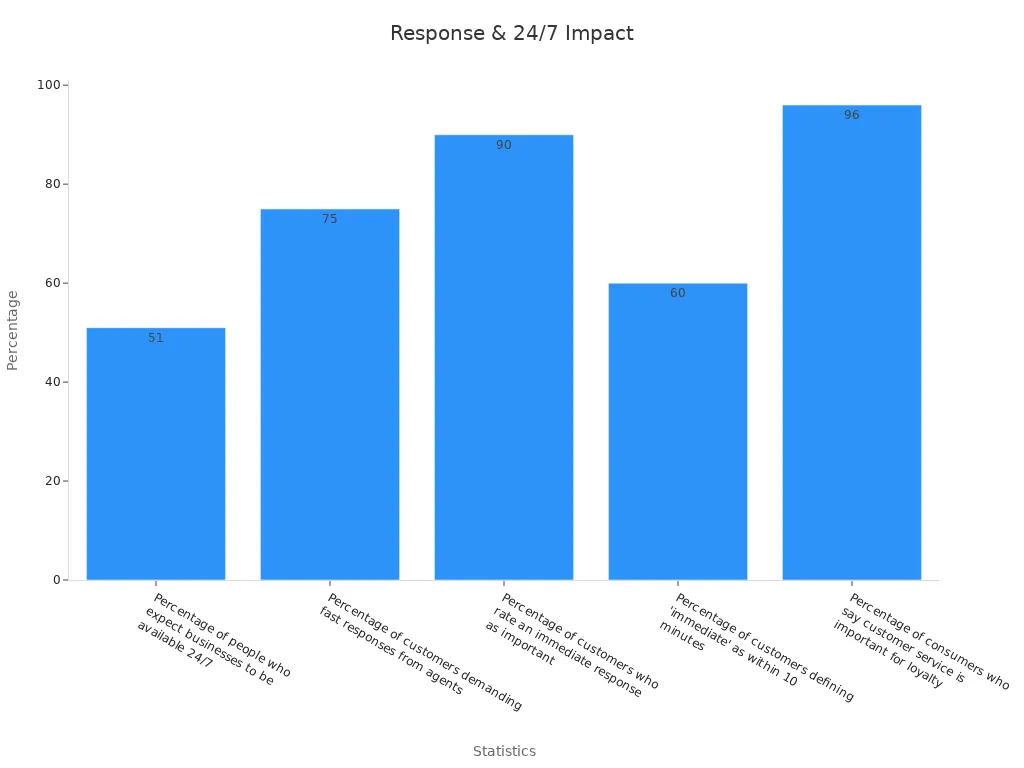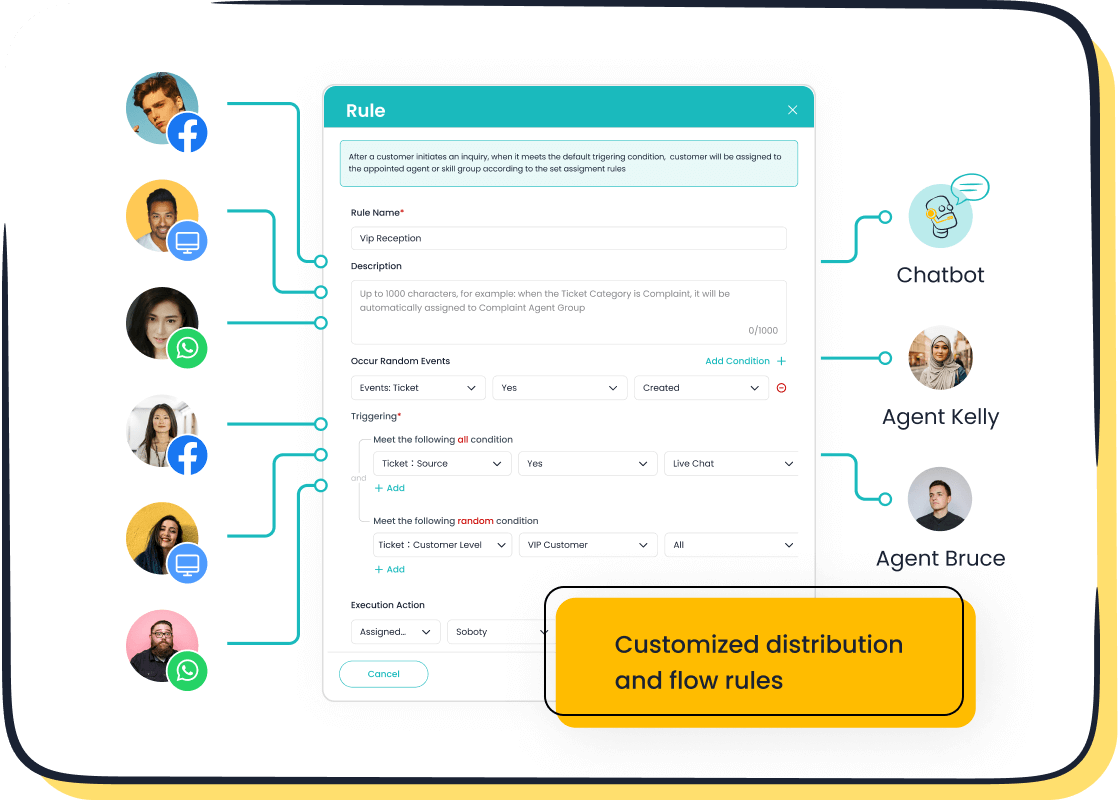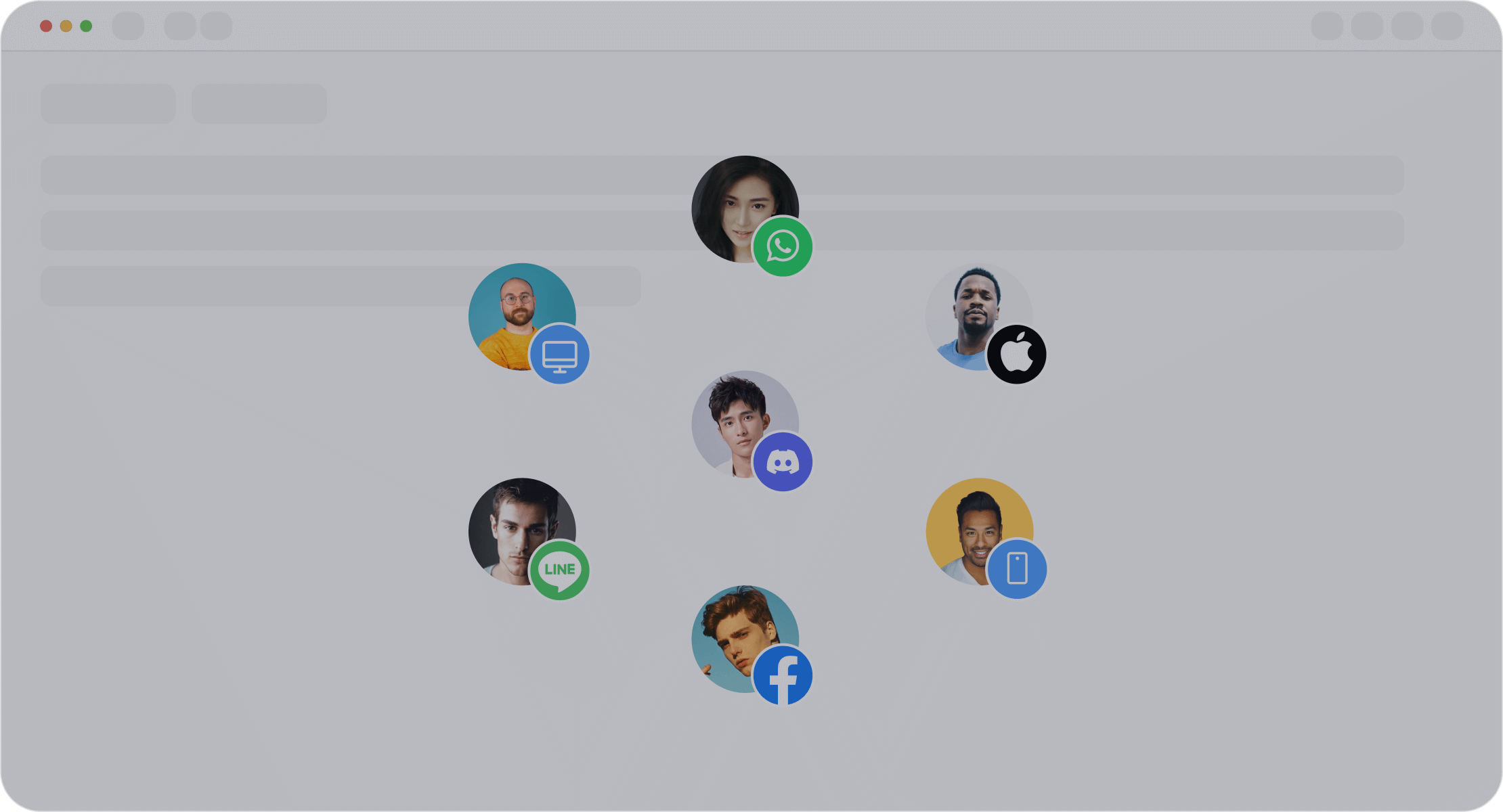AI Tools Transforming Customer Service Efficiency

Imagine a world where your customers get instant, personalized support 24/7 without long wait times. That’s the magic of AI tools for customer service. These tools are reshaping how businesses interact with their customers. By automating repetitive tasks, AI reduces the workload for agents, allowing them to focus on complex issues. In fact, companies using AI report resolving tickets 52% faster and cutting first response times by 37%. Tools like Sobot, with its omnichannel capabilities, ensure no query goes unanswered, giving your business a competitive edge in satisfaction and efficiency.
Understanding AI in Customer Service
What Are AI Tools for Customer Service?
AI tools for customer service are software solutions that use artificial intelligence to improve how businesses interact with their customers. These tools can handle tasks like answering questions, solving problems, and even predicting what a customer might need next. Think of them as digital assistants that work alongside your team to make customer support faster and more efficient.
For example, companies like Motel Rocks use AI chatbots to manage customer inquiries. These bots handle simple questions, freeing up human agents to focus on more complex issues. This approach not only saves time but also boosts customer satisfaction.
The Role of AI in Customer Service Operations
AI plays a huge role in making customer service operations smoother. It helps businesses respond to customers faster, even during busy times. Chatbots, for instance, can provide instant answers 24/7, which is perfect for late-night shoppers. AI also collects data from customer interactions, giving you insights to improve your services.
Take Camping World as an example. They use an AI assistant called Arvee to handle calls around the clock. This tool has increased customer engagement by 40% and made their agents 33% more efficient. Similarly, Sephora uses AI-powered chatbots to recommend products and answer skincare questions, making the shopping experience more personal and engaging.
Common Applications of AI Customer Service Tools
AI customer service tools are versatile and can be used in many ways. Here are some common applications:
| Application Type | Description |
|---|---|
| AI-driven translation tools | Provide instant multilingual support for global customers. |
| Fraud detection | Identify suspicious transactions to reduce fraud risks. |
| Voice recognition | Authenticate users and direct their queries efficiently. |
| Agent assistance | Suggest responses and provide customer data in real time. |
| Knowledge base management | Maintain smart knowledge bases for accurate and quick answers. |
| Sentiment analysis | Analyze customer mood to improve retention strategies. |
| Social media monitoring | Track and respond to customer inquiries across platforms. |
These applications show how AI tools can transform customer service, making it more efficient and customer-focused. Whether it’s helping agents with real-time suggestions or monitoring social media for feedback, AI tools are essential for modern businesses.
Key Benefits of AI Tools for Customer Service
Faster Response Times and 24/7 Availability
Imagine reaching out to a business at midnight and getting an instant response. That’s the power of AI in customer service. AI tools like chatbots and virtual assistants ensure your customers never have to wait, no matter the time. In fact, 51% of people expect businesses to be available 24/7, and 90% of customers say immediate responses are crucial. With AI customer service tools, you can meet these expectations effortlessly.
These tools also handle multiple queries at once, reducing wait times by 55%. For example, chatbots can manage simple questions while your agents focus on more complex issues. This balance not only speeds up response times but also improves customer satisfaction.

Enhanced Customer Satisfaction Through Personalization
Personalized customer experiences are no longer a luxury—they’re a necessity. AI customer support software uses data to understand your customers better. It can analyze past interactions, preferences, and even sentiment to tailor responses. This level of personalization boosts customer satisfaction by 48% and strengthens customer retention.
For instance, AI tools for customer service can recommend products based on browsing history or suggest solutions that match a customer’s unique needs. This makes every interaction feel meaningful and builds trust. When customers feel valued, they’re more likely to stay loyal to your brand.
Cost Savings and Operational Efficiency
AI customer service tools don’t just improve service—they save money too. By automating repetitive tasks like data entry and ticket management, these tools reduce labor costs and free up resources. Businesses using AI report a 53% reduction in operational costs and save an average of $4.3 million in staffing expenses.
AI also minimizes errors, which lowers costs associated with mistakes or fraud. Plus, it streamlines workflows, making your team more productive. With these tools, you can handle more inquiries without increasing your team size, ensuring both efficiency and cost-effectiveness.
| Benefit Description | Percentage/Impact |
|---|---|
| Reduction in operational costs for telecom companies | 30% |
| Time saved through automation of manual tasks | 31% |
| Simplification of ticket response | 84% |
| Boosted productivity of customer service specialists | 94% |
| Lowered costs due to higher efficiency | 65% |
AI customer support tools are a game-changer for businesses looking to enhance customer experience while keeping costs in check.
Scalability for Growing Businesses
As your business grows, so do your customer service needs. Handling a surge in inquiries can feel overwhelming, but AI tools make scaling up seamless. These tools adapt to your business size, ensuring you can manage increasing demands without sacrificing quality. Whether you're a startup or an established enterprise, AI equips you to handle growth effortlessly.
AI tools like chatbots and virtual assistants work around the clock, managing multiple queries simultaneously. This means you can serve more customers without hiring additional staff. Over 30% of companies using AI report significant time savings, allowing teams to focus on strategic tasks instead of repetitive ones. Imagine having a system that grows with you, reducing errors and improving accuracy as your operations expand.
Tip: AI tools not only scale with your business but also enhance customer engagement. Chatbots provide 24/7 support, ensuring no query goes unanswered.
The financial benefits are just as impressive. AI tools analyze data efficiently, helping you make smarter decisions that boost profitability. They also reduce operational costs by automating tasks like ticket management and data entry. With 77% of businesses exploring AI, it's clear that scalability through technology is the way forward.
When you invest in AI, you're not just preparing for growth—you're setting the stage for long-term success. These tools ensure your customer service remains efficient, no matter how big your business gets. So, why wait? Start scaling smarter today.
Top AI Tools Transforming Customer Service in 2025


Sobot Live Chat: Unified Omnichannel Support
Imagine having all your customer interactions—whether through social media, your website, or messaging apps—streamlined into one platform. That’s exactly what Sobot Live Chat offers. This AI-powered customer support tool ensures you never miss a query by unifying communication channels like WhatsApp, Facebook, Instagram, and even Telegram. With its omnichannel capabilities, you can provide seamless support no matter where your customers are.
Sobot Live Chat doesn’t just stop at integration. It uses AI to assist agents with real-time assistance, offering intelligent suggestions and automating repetitive tasks. This boosts agent efficiency and ensures faster response times. Its built-in analytics evaluates over 150 indicators, helping you make data-driven decisions to improve your customer service. Businesses using Sobot Live Chat have reported a 38% increase in conversion rates, thanks to its precise profiling and tailored services.
Tip: Sobot Live Chat also offers a free trial, so you can experience its benefits firsthand.
Learn more about Sobot Live Chat here.
ChatGPT: Conversational AI for Real-Time Interactions
When it comes to conversational virtual agents, ChatGPT stands out as a game-changer. This AI tool excels at providing real-time assistance, making customer interactions smoother and more engaging. It uses advanced natural language processing to understand and respond to customer queries in a way that feels human.
ChatGPT doesn’t just answer questions—it recognizes emotional cues and adjusts its tone accordingly. This makes interactions more personalized and satisfying. For example, if a customer sounds frustrated, ChatGPT can offer empathetic responses to de-escalate the situation. Businesses using ChatGPT have seen improvements in user engagement and conversational quality, thanks to its ability to maintain dialogue coherence and adapt to emotional contexts.
Did you know? Real-time insights from ChatGPT allow businesses to identify areas for improvement during interactions, ensuring continuous optimization.
Zendesk AI: Streamlined Ticket Management
Managing a high volume of tickets can be overwhelming, but Zendesk AI simplifies the process. This customer service software uses AI to automate ticket sorting, routing, and even resolution. By assigning tickets based on agent expertise, it ensures faster response times and higher customer satisfaction.
Companies like Medline have leveraged Zendesk AI to manage over 800,000 tickets annually, significantly boosting productivity. Khan Academy achieved a 92% customer satisfaction score by using automated triage to prioritize and resolve issues efficiently. These examples highlight how Zendesk AI transforms ticket management, making it a vital tool for businesses looking to enhance their customer service operations.
| Company | Efficiency Benefit | Customer Satisfaction | Ticket Volume Managed |
|---|---|---|---|
| Medline | Increased employee productivity with AI bots, managing over 800,000 tickets/year. | N/A | 800,000+ |
| Khan Academy | Achieved a 92% customer satisfaction score through automated triage. | 92% | N/A |
| Grove Collaborative | Streamlined ticket requests with intelligent triage, eliminating manual assignment. | N/A | N/A |
| Peek | Reduced manual process time from 4-5 hours to just 5 minutes. | N/A | N/A |
Note: AI chatbots in Zendesk AI also work 24/7, ensuring no ticket goes unresolved, even during peak times.
Salesforce Einstein: Predictive Analytics for Proactive Support
What if you could predict your customers' needs before they even ask? That’s the magic of Salesforce Einstein. This AI-powered customer ai agent platform uses predictive analytics to help you deliver proactive support. By analyzing customer data, Einstein identifies patterns and trends, allowing you to anticipate issues and offer solutions before they become problems.
Imagine a customer frequently contacting your support team about delayed deliveries. With Einstein, you can spot this trend early and send proactive updates or alternative solutions. This not only resolves issues faster but also builds trust and loyalty.
Einstein also empowers your team with real-time assistance. It suggests the best actions for agents to take during interactions, ensuring every conversation is efficient and effective. Plus, its integration with Salesforce’s CRM means all customer data is in one place, making it easier to provide personalized support.
Tip: Use Einstein’s predictive capabilities to identify upselling opportunities. For example, if a customer shows interest in a product upgrade, Einstein can recommend the perfect time to pitch it.
Businesses using Salesforce Einstein have reported higher customer satisfaction and reduced churn rates. By staying one step ahead, you can turn customer service into a competitive advantage.
Zowie: Automating Customer Service Tasks
If you’re looking to automate customer service, Zowie is a tool you’ll want to explore. This AI-driven platform specializes in handling repetitive tasks, freeing up your team to focus on more complex issues. It’s like having an extra set of hands that works tirelessly around the clock.
Zowie’s automation capabilities are impressive. It can resolve 70% of customer questions without human intervention, ensuring faster response times and happier customers. For example, if a customer asks about order tracking, Zowie’s chatbot can provide instant updates. This not only saves time but also reduces operational costs.
Here’s why Zowie stands out:
- It increases average order value (AOV) by up to 47%.
- Chatbot interactions cost just 10 cents compared to $8 for human conversations.
- Automation improves efficiency, cutting costs by up to 30%.
Zowie also excels at meeting customer expectations. With 90% of customers expecting immediate responses, Zowie ensures no query goes unanswered. Its ability to handle high volumes of inquiries makes it ideal for businesses experiencing rapid growth.
Did you know? Zowie’s automation tools can integrate with your existing systems, making implementation seamless and hassle-free.
By adopting Zowie, you’re not just improving efficiency—you’re enhancing the overall customer experience. It’s a win-win for both your team and your customers.
Intercom: Real-Time Engagement and Communication
When it comes to real-time engagement, Intercom is a game-changer. This platform combines live chat, real-time messaging, and automation to create meaningful customer interactions. Whether you’re answering questions or guiding users through your website, Intercom makes communication effortless.
One of Intercom’s standout features is its live chat widget. It allows you to provide immediate support, which increases customer satisfaction and builds trust. For example, if a visitor is browsing your pricing page, you can use Intercom to initiate a conversation and address their concerns in real time.
Here’s what makes Intercom a must-have:
- Visitor tracking enables personalized communication based on user behavior.
- Advanced segmentation allows you to send targeted messages, improving engagement.
- Multi-channel support ensures consistent communication across platforms.
- Chatbots handle FAQs and route inquiries efficiently, saving time for your team.
Intercom also supports sharing media like images and videos during chats. This makes it easier to resolve complex issues. For instance, you can send a quick tutorial video to help a customer troubleshoot a problem.
Pro Tip: Use Intercom’s analytics tools to measure engagement and optimize your customer support strategy.
By integrating Intercom into your customer support tools, you’re not just answering questions—you’re creating memorable experiences. Its focus on real-time assistance and personalized communication makes it a powerful tool for building lasting customer relationships.
How to Effectively Integrate AI Tools into Your Customer Service Strategy
Assessing Business Needs and Choosing the Right Tools
Before diving into AI, you need to understand your business needs. Start by identifying the challenges your customer service team faces. Are response times too slow? Are repetitive tasks eating up your agents’ time? Once you pinpoint these issues, look for AI tools that align with your goals.
For example, a regional chain of hobby stores used AI to improve inventory management and customer engagement. They chose tools that streamlined operations and enhanced customer experience. Similarly, an electronics store leveraged AI to personalize in-store interactions and boost sales. These success stories show how assessing needs leads to smarter decisions.
When evaluating AI tools, focus on their ability to reduce response times and streamline processes. Info-Tech’s methodology suggests considering expected value and key buying influences. This ensures you select tools that enhance efficiency and comply with regulations. Whether you’re choosing customer service software or ai-powered agent assistance, a systematic approach avoids inefficiencies and compliance risks.
Training Teams to Use AI Customer Service Tools
AI tools are only as effective as the people using them. Training your team is crucial for success. Start with structured programs like the Kirkpatrick Model, which evaluates training across four levels: reaction, learning, behavior, and results. This helps you measure how well your team adapts to AI-driven automation.
Use KPIs to track progress. Metrics like resolution time and customer satisfaction show whether your training aligns with business goals. A continuous learning framework also keeps your team updated as AI evolves. For example, agent assist tools require ongoing skill improvement to maximize their potential.
Tip: Encourage hands-on practice during training sessions. Let agents explore AI tools in real scenarios to build confidence and familiarity.
Monitoring Performance and Optimizing AI Tools
Once your AI tools are up and running, monitoring their performance is key. Real-time tracking lets you measure metrics like call resolution time and customer satisfaction. Automated workforce management streamlines follow-ups, ensuring customers feel heard.
Intelligent call routing is another optimization strategy. It directs calls based on urgency and agent availability, improving response times. For example, if a customer has an urgent issue, the system prioritizes their call, enhancing service quality.
Regular reviews help you identify areas for improvement. Use AI insights to tweak workflows and ensure your tools stay efficient. Optimization isn’t a one-time task—it’s an ongoing process that keeps your customer service software performing at its best.
Ensuring Data Security and Compliance
When you use AI tools in customer service, keeping your customers' data safe should be a top priority. With the rise of data breaches and privacy concerns, ensuring security and compliance isn’t just a good practice—it’s essential. Customers trust you with their personal information, and protecting it builds loyalty and credibility.
AI tools often handle sensitive data, like customer names, addresses, and even payment details. To stay compliant, you need to follow strict regulations. Frameworks like GDPR and CCPA set clear rules for how businesses should manage data. For example, GDPR requires transparency and consent, while CCPA gives customers the right to know how their data is used. These laws ensure that AI tools respect privacy and handle data responsibly.
Here’s a quick look at some key compliance frameworks and their requirements:
| Compliance Framework | Key Requirements | Implications for AI Tools |
|---|---|---|
| GDPR | Transparency, consent, right to explanation | AI using personal data must comply with strict data protection principles. |
| CCPA | Right to know, request deletion, opt-out | AI tools must uphold consumer rights regarding data handling. |
| NIST AI RMF | Security, privacy, fairness | Provides a benchmark for responsible AI use and internal audits. |
| HIPAA | Limits on patient data usage | Stricter compliance for healthcare AI applications. |
| SEC Guidance | AI-specific guidance for financial institutions | Compliance expectations for AI in finance. |
Tip: Regularly audit your AI tools to ensure they meet these compliance standards. This helps you avoid penalties and keeps your customers’ trust intact.
By prioritizing data security, you’re not just protecting your business—you’re showing your customers that their privacy matters. When you combine secure AI tools with compliance, you create a safer, more reliable customer service experience.
Future Trends in AI for Customer Service

Generative AI for Personalized Customer Interactions
Generative AI is changing how you connect with customers. It doesn’t just answer questions—it predicts what your customers need and offers tailored solutions. Imagine calling a support line and feeling like the agent knows your preferences. That’s the level of personalization generative AI delivers.
Companies like Verizon and ING are already using generative AI to enhance customer experiences. Verizon’s AI predicts inquiries, allowing proactive support that feels personal. ING’s pilot program improved efficiency, serving 20% more customers in just seven weeks. Generative AI also helps during shopping. Etsy’s Gift mode curates products based on preferences, making it easier for customers to find what they love.
Here’s why customers love it:
- They get personalized recommendations based on their data.
- It simplifies decision-making during purchases.
- It creates unique experiences, boosting customer retention.
Generative AI is more than a tool—it’s a way to make every interaction meaningful.
AI-Driven Insights for Proactive Customer Support
AI isn’t just reactive anymore. It’s helping you stay ahead by offering real-time customer insights. These insights let you anticipate problems and solve them before customers even notice. For example, if a customer frequently contacts you about delivery delays, AI can flag this trend and suggest proactive updates.
The numbers speak for themselves:
| Statistic | Value |
|-----------|-------|
| Operational Efficiency Increase | 20-30% |
| Customer Satisfaction Boost | 10-15% |
| Customers Want Proactive Contact | 87% |
| Positive Brand Perception Shift | 73% |
Proactive support builds trust and improves customer experience. It also reduces avoidable calls, saving time for both your team and your customers. With AI-driven customer interactions, you’re not just solving problems—you’re preventing them.
Integration of AI with Omnichannel Platforms
AI is making omnichannel customer service smarter. By integrating AI with platforms like websites, apps, and physical stores, you can create seamless experiences. Imagine browsing a store’s app, then visiting the physical location, and having your preferences already known. That’s the power of AI integration.
Big brands like Nike, Amazon, and Sephora are leading the way:
| Company | Integration Strategy | Benefits |
|----------|---------------------|-----------|
| Nike | Mobile app, website, and physical stores integration | Increased online sales and personalized recommendations |
| Amazon | Data collection and analysis from digital channels | Tailored recommendations and optimal user experience |
| Sephora | Various touchpoints including mobile app and physical stores | Continuous customer experience and enhanced loyalty |
This integration doesn’t just improve customer retention—it boosts sales and loyalty. AI ensures every touchpoint feels connected, making your customer service truly omnichannel.
The Growing Role of AI in Customer Success Management
AI is changing the way you manage customer success. It’s not just about solving problems anymore—it’s about creating experiences that keep customers coming back. With AI, you can predict what your customers need, reduce their effort, and make every interaction smoother.
One of the biggest ways AI is helping is through better collaboration between humans and machines. AI handles repetitive tasks, like answering FAQs or tracking orders, while your team focuses on building relationships. This teamwork boosts efficiency and makes your service more personal.
Did you know? AI tools can reduce customer effort by up to 30%, making it easier for them to achieve their goals.
Metrics are key to understanding how AI is transforming customer success. Here’s a quick look at some of the most important ones:
| Metric/Trend | Description |
|---|---|
| AI resolution rates | Measures how well AI solves customer inquiries without human help. |
| Sentiment analysis scores | Tracks customer emotions and satisfaction during interactions. |
| Predictive accuracy measurements | Shows how accurately AI can anticipate customer needs. |
| Human-AI collaboration effectiveness | Evaluates how humans and AI work together to improve service. |
| Customer effort reduction metrics | Quantifies how easy it is for customers to achieve their goals. |
These metrics show how AI isn’t just automating tasks—it’s reshaping customer success management entirely.
Imagine this: AI predicts a customer’s issue before they even contact you. It sends them a solution, saving time and frustration. That’s the future of customer success, and it’s happening now. By using AI, you’re not just solving problems—you’re building loyalty and trust.
Tip: Use AI insights to identify trends and improve your service. When you understand your customers better, you can serve them better.
AI is more than a tool—it’s a partner in creating success for your customers. Are you ready to take your customer success strategy to the next level?
AI tools are no longer optional—they’re essential for delivering top-notch customer service in today’s fast-paced world. They help you respond faster, personalize interactions, and scale your operations effortlessly. By adopting the right tools, you can boost customer satisfaction and stay ahead of the competition. The future of customer support is here, and it’s powered by AI. Are you ready to transform your service strategy?
FAQ
What are AI tools for customer service?
AI tools for customer service are software solutions that use artificial intelligence to improve how you interact with customers. They handle tasks like answering questions, managing tickets, and providing personalized support. These tools make your customer service faster, smarter, and more efficient.
How do AI tools improve customer satisfaction?
AI tools analyze customer data to personalize interactions. They provide instant responses, recommend products, and even predict customer needs. This makes every interaction feel meaningful, which boosts satisfaction and loyalty. Plus, they’re available 24/7, so your customers never have to wait.
Are AI tools expensive to implement?
Not necessarily! Many AI tools, like Sobot Live Chat, offer scalable pricing plans and even free trials. They also save money by automating repetitive tasks, reducing labor costs, and improving efficiency. Over time, the cost savings often outweigh the initial investment.
Can AI tools work with my existing systems?
Yes, most AI tools integrate seamlessly with your current systems. For example, Sobot Live Chat connects with platforms like WhatsApp, Facebook, and Instagram. This ensures smooth communication across channels and helps your team work more efficiently.
Do AI tools replace human agents?
No, AI tools don’t replace humans—they work alongside them. AI handles repetitive tasks, freeing your agents to focus on complex issues. This teamwork improves efficiency and ensures your customers get the best of both worlds: speed and a personal touch.
Tip: Use AI to enhance your team’s productivity, not replace it. It’s all about collaboration!
See Also
Enhancing Efficiency With AI-Driven Customer Service Solutions
Transforming Support Through AI Customer Service Agents
Best 10 AI Solutions For Enterprise Contact Centers
